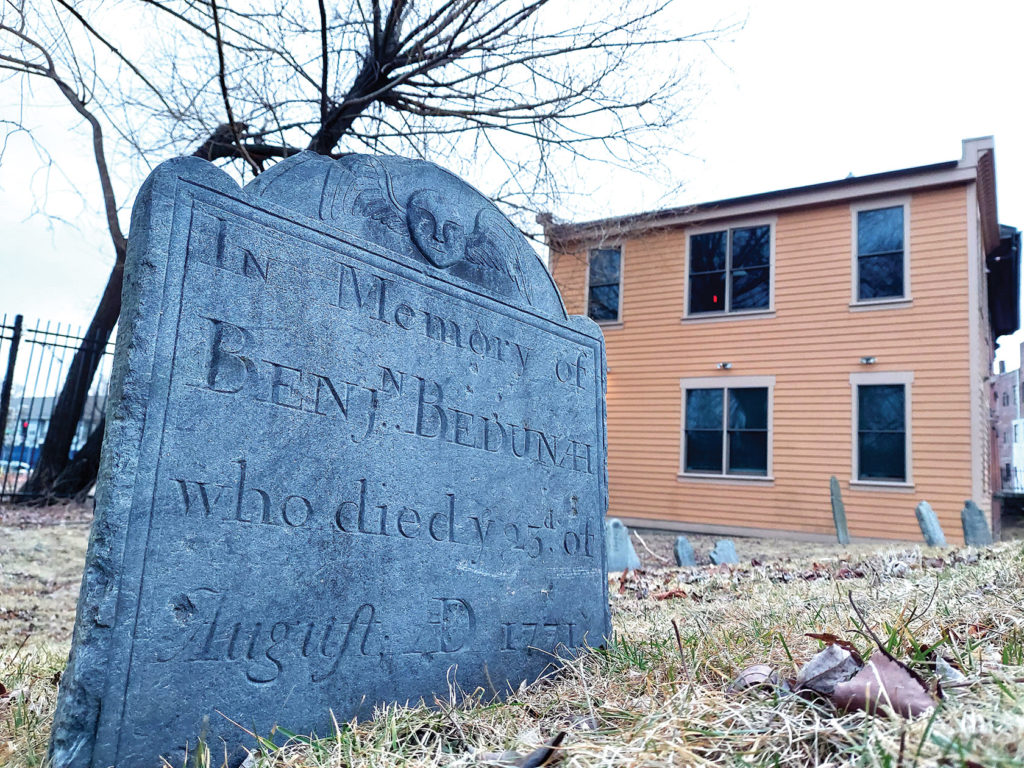Colonial-era marriage challenged race norms
Thomas Bedunah founded prominent Roxbury family

October 1703 was typical of New England’s notoriously atypical weather. By the fourth of the month, an early blizzard had left a considerable accumulation of snow on the streets of Boston and its surrounding Puritan communities.
On that snowy morning, Oct. 4, 1703, Thomas Bedunah and Lydia Craft made the four-mile trek from Roxbury to the Boston home of Justice of the Peace Samuel Sewall, the one man they trusted would agree to marry an interracial couple.
Sewall had publicly aired his view that slavery was wrong in a tract written in 1700 where he asserted that all men have an “equal Right unto Liberty, and all other outward Comforts of Life.”
Sewall joined the couple in marriage and helped establish the Bedunah name — thought to originate in the West African Akan tribe — in the United States. Descendants of Thomas and Lydia can be found in Boston, West Virginia, Ohio, Minnesota, Texas, Oregon and other states. But few of those descendants, all of whom are white, know that their name originated with an African man thought to have been born in Roxbury in 1680.
It wasn’t until 303 years after the Bedunah/Craft wedding that Curtiss DeYoung found out his ninth great-grandfather was African.
“Our family is white,” said DeYoung, the executive director of the Minnesota Council of Churches. “They lost the connection to their African ancestry.”
DeYoung’s mother had been researching the family genealogy and was able in 2006 to trace her grandmother Julia Bedunah’s lineage back to Thomas and Lydia. The family has embraced this previously unknown aspect of their history.
But DeYoung says his family may have reacted differently had the discovery occurred earlier.
“Had this been discovered by our family members in the 1930s or ’40s, our racial designation could have changed,” he said.
During most of the 20th century, racial designations in the United States operated under the so-called one-drop rule, the idea that any known Black ancestry, even DeYoung’s less-than-a-half percentage point heritage, meant that a person was legally Black.
For DeYoung, who is married to a Black woman and graduated from Howard University Divinity School, such a revelation would hardly cause consternation. He sees the Bedunah/Craft marriage as an interesting window into the evolving notions of race in colonial America.
“I find it fascinating,” he said. “It’s a point in our history when race was still formalizing itself. It was before the one-drop rule.”
Thomas and Lydia’s marriage was also two years before the Massachusetts Legislature, prompted in part by their union, outlawed sexual intercourse and marriage between whites and people of other races, passing An Act for the better Preventing of a Spurious and Mixt. Issue. The law included “Negros” and “Mollatos” — or mixed-race people.
Despite that law, each of the Bedunah children who married wed whites. In the military record of grandson Moses Bedunah, who fought in the Revolutionary war, there is no mention of race, suggesting that he was considered white.
Aabid Allibhai, a Ph.D. candidate in African and African American Studies at Harvard University, noted in a report on slavery at the First Church in Roxbury that the First Church did not indicate the race of the Bedunah children. Racial designations in church registers and other Colonial records were reserved only for African and Wampanoag people. That suggests that the church considered them white.
It’s clear that racial mixing continued in Roxbury and throughout the Massachusetts Bay Colony following the 1705 law banning such unions. So what happened to the law? Was it poorly enforced? Were Bedunah children considered white by colonial authorities?
Historian Byron Rushing, a former Massachusetts state representative, said the Legislature may not have bothered to define what constituted “Negro” or “molatto.” Craft’s status as a white woman may have conferred on her children the same status.
“Racial definitions are arbitrary,” he said.
In Massachusetts Bay Colony, mixing between whites and Blacks was relatively new, and the white colonists were slow in catching up to the emerging reality.
While the colonists often enforced laws against fornication, Rushing notes that many people in New England lived in common-law marriages, cohabiting without the sanction of church or state.
“It was all very relaxed in those days,” he said. “You didn’t have to marry if you didn’t have property.”
Were there others?
Given the more fluid definitions of race in Massachusetts Bay Colony, it’s likely there were other mixed-race families who became white.
Wayne Tucker, a historian who documents the history of slavery in the New England states, notes that the Black population in Massachusetts declined from the time of the American Revolution into the 1800s.
“There’s no information about where people went,” he said.
How many African-descended people disappeared into the white world? It’s impossible to say. But according to a 2014 genetic study analyzing data from the DNA Testing firm 23andMe, 4% of whites in America have African DNA. That could mean as many as 7.8 million whites have distant — and not-so-distant — Black ancestors. Among them, probably hundreds of Bedunah descendants.








